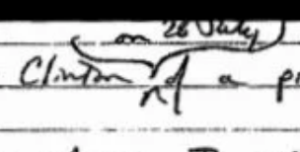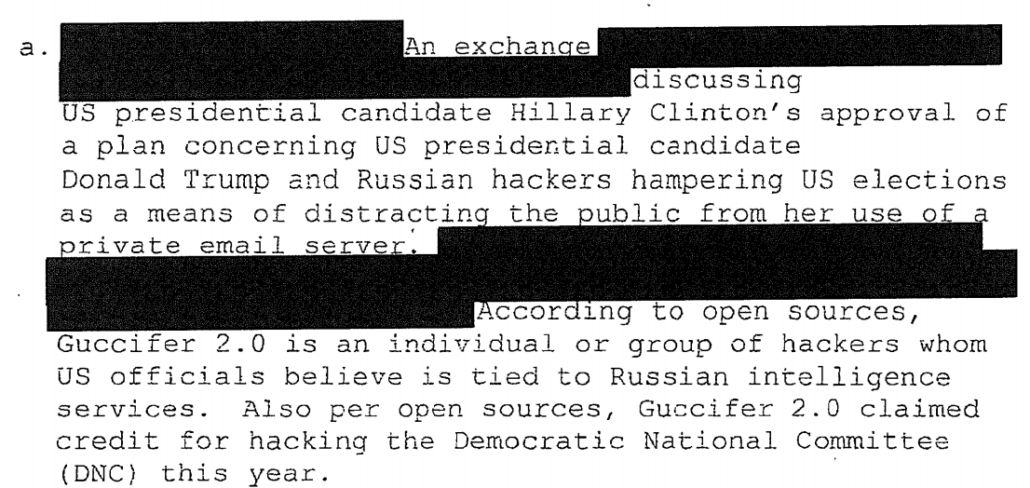I was going to wait to address the frothy right’s latest attempt to gaslight an election year scandal by recycling Russian intelligence — which might well be disinformation — in an attempt to suggest that Hillary Clinton, in all-powerful fashion, managed to drum up not just the entire Russian investigation into Donald Trump, but also went back in time and planted the evidence dating back months and years that substantiated investigative concerns.
But there’s something so fundamentally stupid about this latest effort I can’t wait to lay out the other reasons this report is actually more damning for Republicans.
At issue is a report from John Ratcliffe, sent on September 29, 2020, explaining that,
In late July 2016, U.S. intelligence agencies obtained insight into Russian intelligence analysis alleging that U.S. Presidential candidate Hillary Clinton had approved a campaign plan to stir up a scandal against U.S. Presidential candidate Donald Trump by tying him to Putin and the Russians’ hacking of the Democratic National Committee. The IC does not know the accuracy of this allegation or the extent to which the Russian intelligence analysis may reflect exaggeration or fabrication.
The following week, presumably in an attempt to dredge up some kind of attack out of an absurd attack, Ratcliffe released the underlying reports that, he claimed in his original report, show the following:
According to his handwritten notes, former Central Intelligence Agency Director Brennan subsequently briefed President Obama and other senior national security officials on the intelligence, including the “alleged approval by Hillary Clinton on July 26, 2016 of a proposal from one of her foreign policy advisors to vilify Donald Trump by stirring up a scandal claiming interference by Russian security services.”
On 07 September 2016, U.S. intelligence officials forward an investigative referral to FBI Director James Comey and Deputy Assistant Director of Counterintelligence Peter Strzok regarding “U.S. Presidential candidate Hillary Clinton’s approval of a plan concerning U.S. Presidential candidate Donald Trump and Russian hackers hampering U.S. elections as a means of distracting the public from her use of a private mail server.”
By releasing the exhibits, Ratcliffe should raise real questions about his credibility. For example, I’m not at all sure this date, from Brennan’s notes, reads July 26 and not July 28, a critical difference for a ton of reasons.
The FBI report has a slew of boilerplate making it clear how sensitive this report was (for obvious reasons; effectively it shows that the CIA had some kind of visibility into Russian intelligence analysis), which makes it clear how utterly unprecedented this desperate declassification is. Former CIA lawyer Brian Greer discusses that in this Lawfare post.
Plus, Ratcliffe left out an unbelievably important part of the report: the role of Guccifer 2.0 in the Russian report. Intelligence collected in late July 2016 claimed that Hillary was going to work her alleged smear around neither the GRU (which had already been identified as the perpetrator of the DNC hack) nor WikiLeaks (which had released the DNC files, to overt celebration by the Trump campaign), but Guccifer 2.0, who looked to be a minor cut-out in late July 2016 (when this intelligence was collected), but who looked a lot more important once Roger Stone’s overt and covert communications with Guccifer 2.0 became public weeks later.
The report suggests Hillary magically predicted that days after this plot, President Trump’s rat-fucker would start a year’s long campaign running interference for Guccifer 2.0. Not only did Hillary successfully go back and trick George Papadopoulos into drunkenly bragging about Russian dangles in May 2016, then, Hillary also instantaneously tricked Stone into writing propaganda for Guccifer 2.0 days later.
No wonder they consider Hillary so devious.
Mind you, rather than producing evidence that Hillary seeded this story with the FBI (when her public attacks on Trump went right after the Russian intelligence services involved), they appear to be claiming that Hillary used the Steele dossier — which included no reporting on Guccifer 2.0, which was a very early sign of its problems — to plant a story that centered on Guccifer 2.0.
Next up, they’re going to accuse Hillary of going back in time and planting the extensive forensics that prove that the Guccifer 2.0 persona was a GRU operation.
Lucky for them, stupid stories work just fine for gaslighting the weak-minded frothers.
But here’s the craziest aspect of all of this.
The FBI report released here, dated September 7, describes three pieces of intelligence that a CIA fusion cell had collected that might be useful for the Crossfire Hurricane team. a, b, c.
The intelligence on Hillary is paragraph a.
This is CIA intelligence reporting on an American citizen, which means the original report would have necessarily masked the US person, which John Brennan would have had to unmask before reporting it at the White House meeting.
For the set of documents Ratcliffe released to exist, it would mean that John Brennan unmasked candidate the identity of Hillary Clinton, right in the middle of a presidential campaign, and shared raw intelligence incorporating that unmasked identity with others. For the Hillary intelligence to appear as paragraph a would mean she was likely the first American CIA unmasked in reporting that got shared as part of Crossfire Hurricane.
The people chasing this gaslight are some of the same people who continue to wail that — four months later — a bunch of people unmasked a report on Mike Flynn that was not, given what we can see from the closing documents in the case, shared with the Crossfire Hurricane team. For example, Andy McCarthy has written about unmasking over and over and over. Yet here he is, hopping on this latest gaslight, with nary a mention that after all this time, it looks like Hillary was the first person — the Presidential candidate herself!!! — to have her identity unmasked by the nefarious Crossfire Hurricane team.

